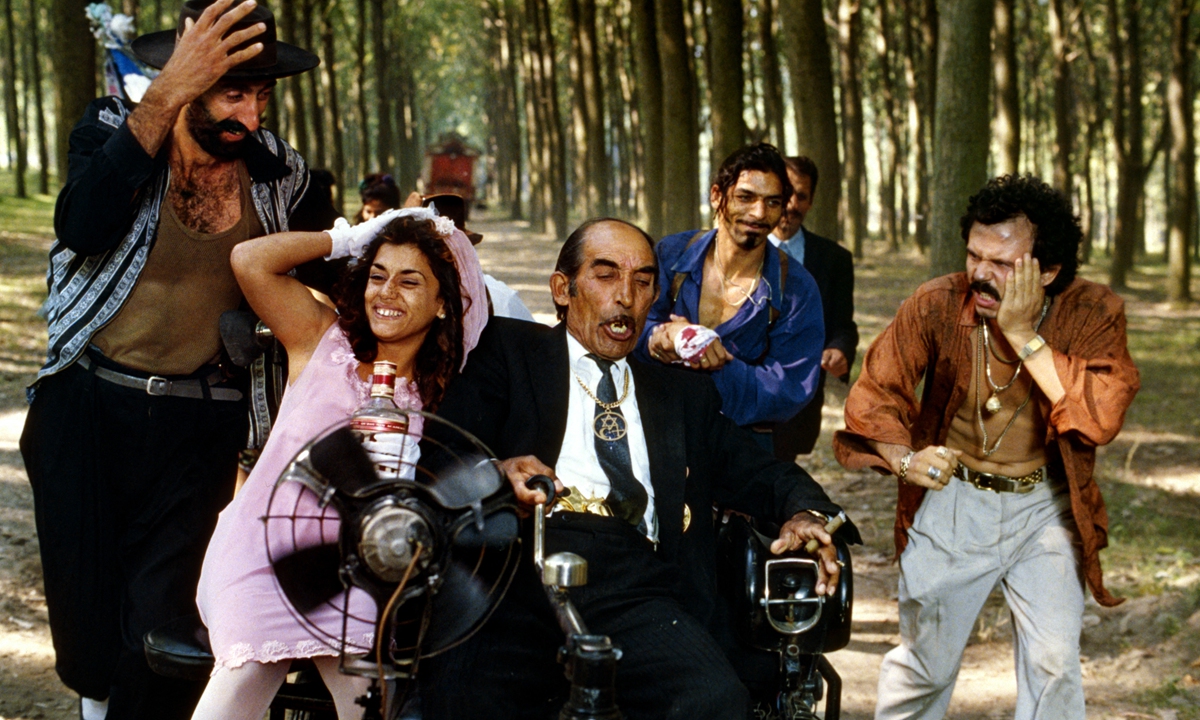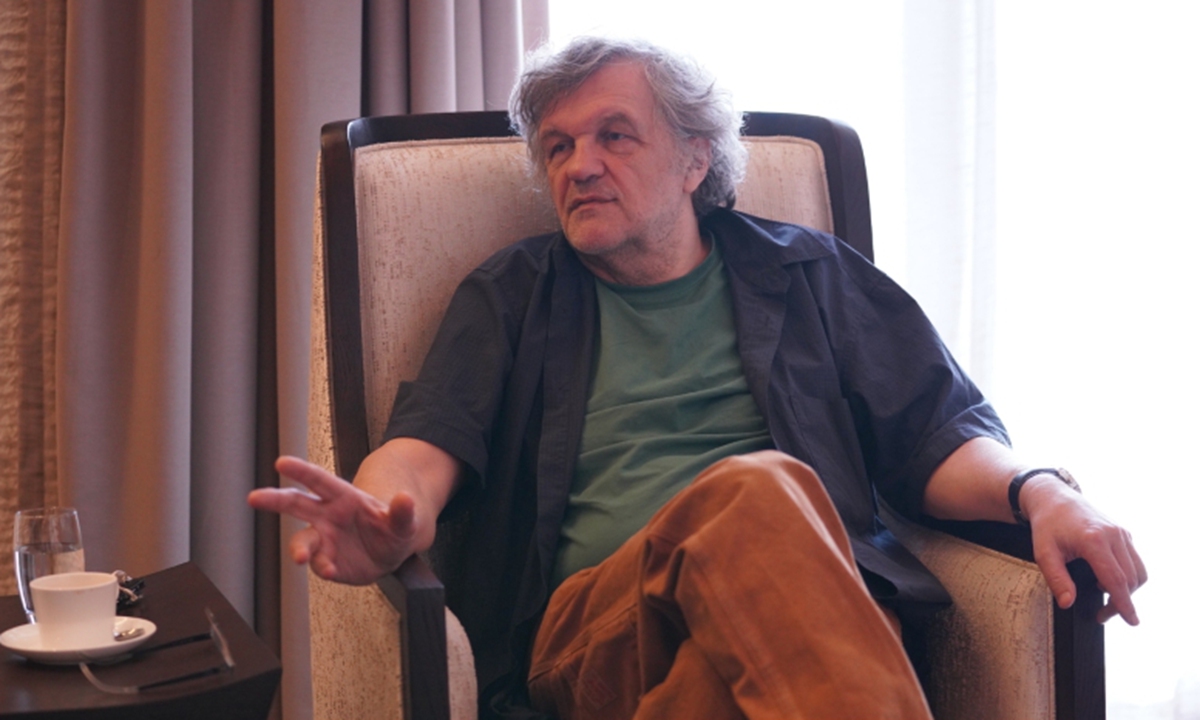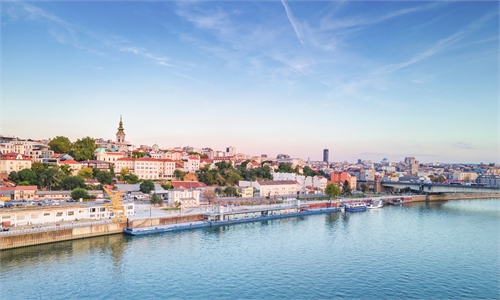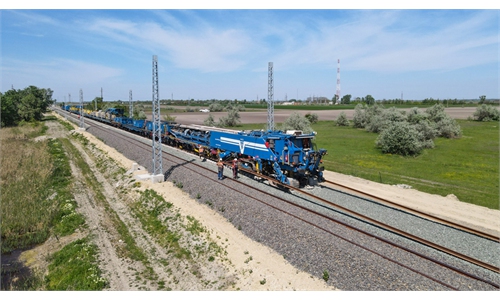ARTS / CULTURE & LEISURE
China’s cultural resilience, spiritual outlook inspire Serbia to firmly choose closer ties: director Emir Kusturica
Silver screen friendship

A still from the film Black Cat, White Cat directed by Emir Kusturica Photo: AFP
Although Serbia and China are geographically thousands of miles apart, the distance between the hearts of the two peoples is close.Chinese President Xi Jinping said the Chinese people have always cherished a special bond of friendship with Serbia, when attending a welcome banquet held by Serbian President Aleksandar Vucic in Belgrade, Serbia, on Wednesday, noting that Serbian athletes Novak Djokovic and Nikola Jokic, and movie director Emir Kusturica are household names in China.
Although films like The Bridge, Walter Defends Sarajevo, and Underground are beloved by Chinese audiences, who draw inspiration and spiritual strength from them, for Kusturica, affectionately known as "Uncle Ku" by Chinese movie fans, his connection with China goes beyond the passion for and emotion evoked by movies themselves.
In June 2016, the internationally recognized film director appeared in China as the Jury President for the Golden Goblet Award's main competition at the 19th Shanghai International Film Festival, coinciding with President Xi's historic visit to his homeland. In 2024, before Xi's second visit to Serbia, Kusturica returned to China as the Jury President for the Tiantan Award at the 14th Beijing International Film Festival (BJIFF).
In a recent exclusive interview with the Global Times, Kusturica expressed his firm belief in the friendship between China and Serbia.
"I think President Xi's visit will bring us more opportunity to develop cooperation between the two countries... I hope that this brotherhood friendship will continue," he told the Global Times.
Bright future
Kusturica has always been pleased that the movie Walter Defends Sarajevo, in which he made his debut on the big screen when he was just 18 years old, "had been seen by almost all Chinese people."
Born in 1954 in Sarajevo, former Yugoslavia, Kusturica has witnessed significant historical events such as the fall of the Berlin Wall and the breakup of Yugoslavia. Known for his films' revelry, absurdity, and dark humor, Kusturica incorporates carnival-style performances and vibrant colors that evoke nostalgia. His works, offering a balm for emotional wounds and sparking contemplation on Serbia's grounding, also make him one of the few cinematic masters to have won awards at all of Europe's three top events - the Venice Film Festival, the Berlin International Film Festival, and the Cannes Film Festival.
He believes that the "Slavs seal" on his movies serves to make difficult subjects more poetic and humorous than in other meticulously crafted films.
And when discussing crafted movies with the Global Times, Kusturica also openly expressed his confidence in Chinese cinema, praising the quality and popularity of Chinese films and foreseeing a bright future for the industry.

Serbian director Emir Kusturica during an exclusive interview with the Global Times Photo: Lin Xiaoyi/GT
Kusturica has also visited local film schools and witnessed the abundance of talented filmmakers and well-equipped facilities."I believe that in China, you will have a chance to develop your stories with these talented people," he said.
"The civilization of China is different from Europe, but it has a lot in common with other civilizations," Kusturica said, noting that "seeking common ground while preserving differences" has been well represented by China's film industry,
According to his observation, in China, people are increasingly realizing that culture is actually at the forefront of civilization, and Chinese films have successfully defended their own culture.
"It is very wise to tell Chinese people's own story, and develop China's own film industry, rather than blindly imitating Europe and America," Kusturica said, adding that American movies, in many cases, "[their high box office] comes together with the military power."
Against the backdrop of a tumultuous history and a reality intertwined with joy and sorrow, Kusturica has always used movies to contemplate grander themes such as politics, war, nationality, and history.
Solidarity in new 'bombardment'
In Kusturica's view, China can present the world with different philosophical reflections.
Making a movie is not like making an atomic bomb and then throwing it into the world causing harm to many people, but it is about observing people's behavior and caring for the public, Kusturica said at the film master class held at the BJIFF on April 24.
"Twenty five years ago today, NATO flagrantly bombed the Chinese embassy in Yugoslavia, killing three Chinese journalists. Shao Yunhuan, Xu Xinghu, and his wife Zhu Ying... The China-Serbia friendship, forged with the blood of our compatriots, will stay in the shared memory of the Chinese and Serbian peoples, and will inspire us to march forward with big strides," President Xi wrote in his signed article prior to his arrival in Serbia.
During the interview with the Global Times, Kusturica also mentioned this "very dramatic moment."
"Currently, China's development scale is huge and has gained discourse power in many fields. Some countries try to suppress China's development. However, in this context, I still see China persisting in defending its cultural traditions and see Chinese movies expressing the cultural perseverance and spiritual outlook of the Chinese people," Kusturica emphasized.
Kusturica believes that China's economic scale and soft power are the country's most powerful defenses, and are continuously demonstrating positivity on the global stage.
During the master class, Kusturica said he saw Chinese people traveling around the world, and "they did not bring gunfire and bullets; they brought peace, and brought a continuous potential for development to other countries."
In 1999, NATO bombed Yugoslavia. Then, the relations between China and Serbia continued to move forward due to the deep intersection and resonance of historical destiny, political ideals, and national emotions.
Twenty five years later, Kusturica believes that the friendship between China and Serbia can still bravely bear a new form of "bombardment" together.
Kusturica said he hopes China will get stronger, noting that Serbia "could certainly be closer to you" than it is now.



